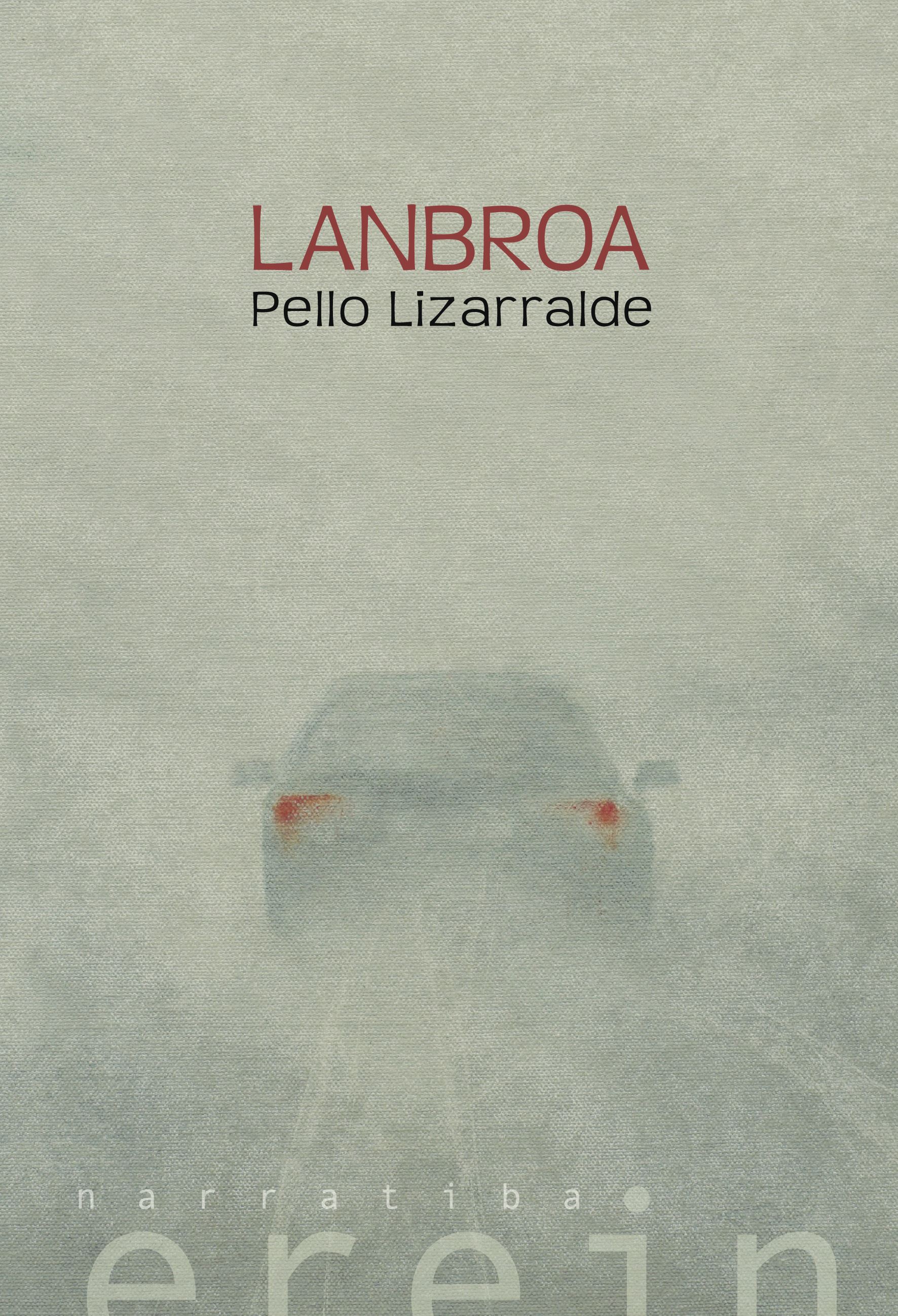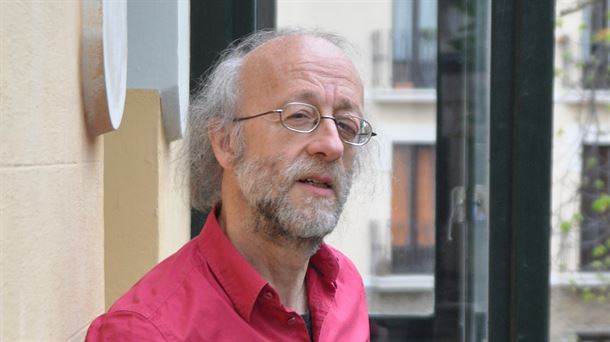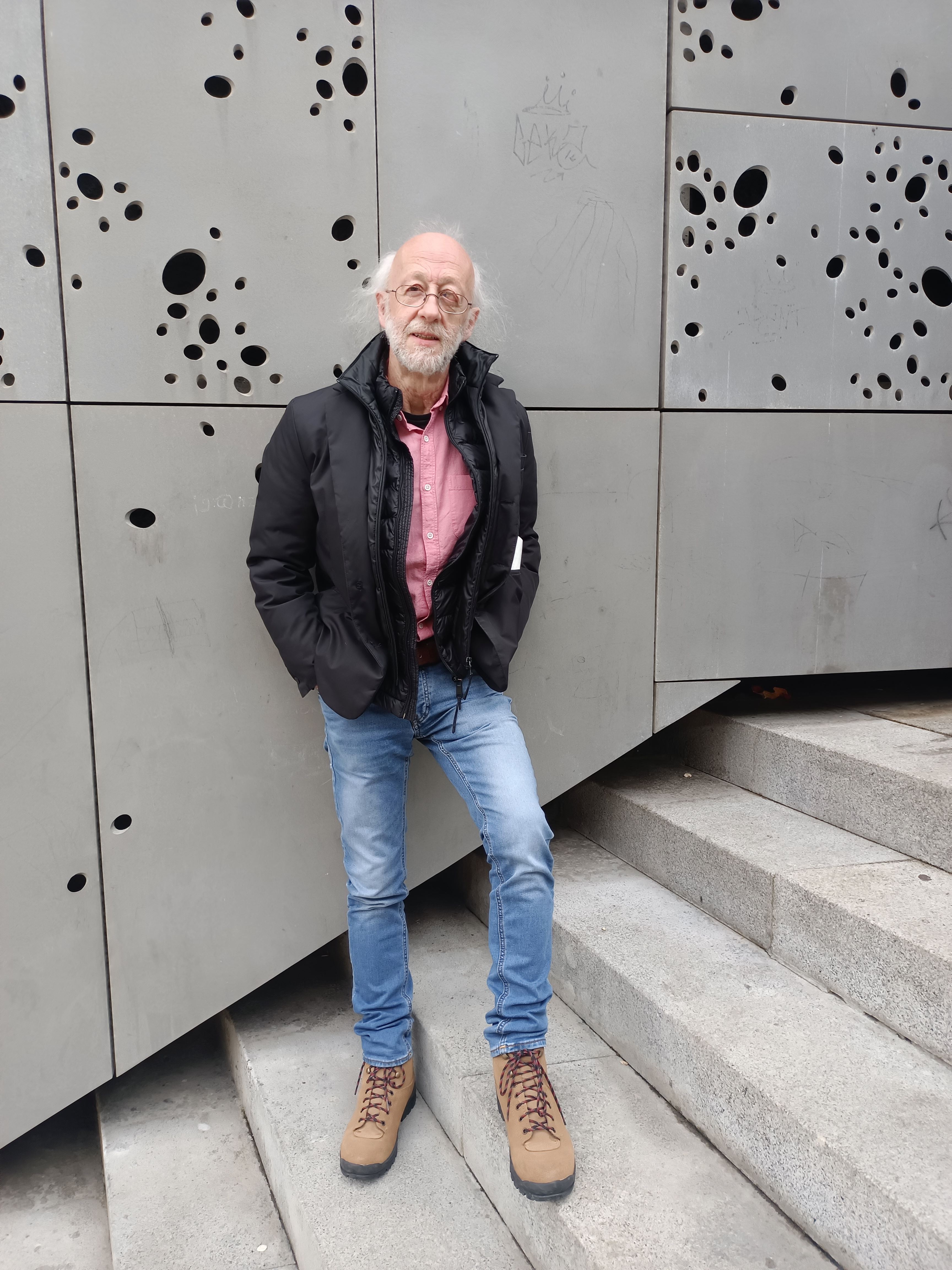Pello Lizarralde: “When it comes to writing, I don’t like to ‘say’, I prefer to ‘show’; explanations are unnecessary”
Euskaraz irakurri: Pello Lizarralde: “Idaztean, ez dut gogoko ‘esatea’, nahiago dut ‘erakutsi’; esplikazioak sovereignan daude”
Twenty years have passed since a woman and a man, unknown to each other until then, shared, without having planned it and forced by circumstances, several hours inside a car. Since then, they have not known anything about that other person: both have been immersed in their particular wars to get ahead and place in their minds everything that those hours generated and stirred, trying to blur and accommodate their memories to their needs; Suddenly, they will meet in a shopping center, each one from their trench, without their eyes crossing just in case.
In Lanbroa, Pello Lizarralde opens the way to the story of two characters who shape, through two planes, a subtle but profound novel. In just over eighty pages there is fuel for reflection on the stories, the diffuse truths, the power relations, the perception and measurement of events, the verisimilitude, the veracity, the moldability of our memories, our mechanisms for forget and, above all, “that something unknown that dominates the alteration between lights and shadows.”
After reading this novel, the reader will feel on the skin those light drops of water that linger once the fog has dissipated, traces of what once was and an embryo for what will come.
We have spoken with Lizarralde about Lanbroa.
You take the characters of the novel, on a twenty-year journey, from a foggy frontier space to a shopping center, from a diffuse not place to another. Why have you set the story in these two locations?
Shopping centers are a perfect reflection of the dreams of the middle class. Everything there is bright, almost perfect. As we consume, the past and the future disappear. Everything is present. However, any distortion is enough for us to begin to immerse ourselves in our current or past little hells.
On the contrary, in the nebulous, humid and gloomy space that the two protagonists traveled, unease, doubt, fear and concern reigned. And, of course, no one wants to travel through territory like this again.

What is the origin of the story? What was the trigger to start writing? Lanbroa?
As in my previous books, in the origin of Lanbroa There is also an image, which in this case is also accompanied by a phrase. These images accompany me for several years, without knowing what they can offer me. At a given moment, without knowing how or why, the image ends up completely imposing itself, and you realize that it leads you to write what you want to tell.
Once the main thread has been defined, comes the most important part of your work: the questions. The vital thing for me is not what I want to tell, but what are the existential questions that the task at hand provokes in me.
And these are not simple issues. They have more than one answer, and, of course, I begin writing convinced that the reader will at some point ask those same questions or ask themselves similar questions. If I achieve that, I can be satisfied.
Lanbroa It offers, among others, questions related to memory and forgetting, which have their origin in the small hells hidden in the corners of the past.
The narrative is based on the stories of the two main and almost only characters in the novel. What advantages and disadvantages has this double point of view brought you?
The most difficult thing has been to balance the voices of the two characters, to offer both the same opportunities. When this is not achieved, defeat is absolute. If you want to do something halfway correct, you can’t make that mistake.
The key is to love all the characters, explain the reasons, doubts and mistakes of each and every one of them.
Surely there are other ways, but it seemed to me that alternating the voices of both was the most correct way to approach that balance.

Pello Lizarralde. Photo: Erein.
How does a writer articulate different subjective accounts about the same event from the point of view of credibility and, above all, truthfulness? To what extent does each of the stories blur or specify the truth?
Like those of us who write, many readers have vices. They need certainties, and if not you close the narrative, they are not satisfied. It’s something I notice very often in reading groups.
More than once I have noticed that some readers are left wanting to ask very specific questions: What really happens? How does it end? Who is right? And who do you support? and those kinds of issues. I answer them with another question: And what have you seen or read? I was clear from the beginning that I had to avoid these evils.
I think that in Lanbroa I have been honest, and I have not hidden anything. There is a clear thread above subjectivity: the power relationship that marks the beginning of history. One of the people in that car has not chosen to be there. No one will deny the consequences of that action, not even the person who caused it.
From there, the simplest thing would have been to impose on the perpetrator of the action the literary punishment that deserve. But in that case, it’s over; You have closed all avenues, and there is nothing worth writing anymore.
That is why it was essential to pull another thread. The memories that both voices recover will not coincide: on the one hand, a lot of time has passed and, on the other, each of them has modulated their memories to alleviate their present and their future, in order to move forward.
In any case, this meeting will thicken the mist that has spread for so many years and will make it difficult to dissipate. And when you recover those memories, you will be asked questions that you had avoided until then: what did I do?, what did I do to him?, I made? and above all, What am I today to him or her, if anything? To a certain extent, the moment of meeting is the first time they look at the other person.
After all this goes through your head, everything becomes more diffuse. The thing is that you have to move forward, and it remains to be seen if all the accumulated fog will contribute to giving you peace or just the opposite.
The first meeting between the protagonists is crossed by a power relationship, as you have said, and that is the origin of all their memories. To what extent are the memories and forgettings of each of the characters conditioned by this situation?
Both characters are aware of where they were during the hours they shared. However, everything may have become blurred as time has passed. If he wants to survive, it is in the interest of the person who has inflicted pain to alleviate the burden of his actions, while for the person who has suffered pain everything becomes complicated from the moment the reasons behind the action in question are considered.
He and she had very different reasons for forgetting what happened, but they needed to forget. However, forgetting is a way of falling asleep, and the problem is the disorder that attacks you when you wake up and what you have to do at that moment to get a little light.
The power relationship established in the first meeting is blurred by the present. They are both now in a shopping center, sharing the same perfect world for a few hours. It doesn’t matter where one or the other comes from, they are both enjoying their free time in the same place, they are both shopping. It doesn’t seem like anything differentiates them. What does that past episode mean today?
Memory is, according to one of the book’s protagonists, something untamable. Even so, those who have inflicted suffering and its beneficiaries often hide behind oblivion in search of peace. Can you really escape memory? Is it just a sad consolation to think that the mind will always complete its path and that the weight of memory will end up reaching those people sheltered in oblivion?
I find everything you mention fascinating. The mysteries of the mind are enormous. I am completely ignorant of scientific matters, and I would gladly receive the knowledge of experts in that field. I only count on my experiences, and that is not always enough. Perhaps it works in my favor that I am no longer young, since birthdays usually bring fascinating discoveries in this field.
Remembering and forgetting are full of illusions. Nothing can be taken for granted. Something always fails in that endeavor. We don’t know what will fade away or be lost forever, nor what memories will emerge and when. In this field, we are undoubtedly condemned to continuous astonishment.
Whoever believes that memory and forgetting can be mastered will be forced to suffer the shocks of reality. Look, if not, at what happens when we try to remember with someone a specific moment that we shared in the past. That person may find what is fundamental to us irrelevant. The same thing happens when we are reminded of the damage caused to another person by what we had already forgotten or when you are the only person who remembers something.
All these situations cause us pangs that are not insignificant, and, if errors and guilt are activated, we will approach the most absolute darkness.
When we relive traumatic events, we expect the complicity of others, and, if this does not meet our expectations, we hopelessly approach the precipice.
It is very difficult to achieve solace in the journey back and forth between memory and oblivion.

Pello Lizarralde. Photo: Erein.
It is a characteristic feature of your works that the perception that the characters have of the actions prevails over the actions themselves. In your writing process, how much do you define and how much do you blur?
In what you write there is also what you do not write. And what you decide not to put on paper is as important as what is written. A trained reader easily identifies the writer’s decisions. It costs me nothing to remove, delete. It would even be more correct to say that it is very easy for me Do not write.
When it comes to writing, I don’t like it sayprefer show. In my writing, explanations are unnecessary. Once minimal instructions have been given, the key is to measure the gaps well.
I never think of a specific reader. I always believe that all readers are more attentive and intelligent than me, and that they can go anywhere.
As a reader, I like books that make me work a little, and when writing I look for something similar.
Are you surprised by the reception and interpretation your works receive?
I attend reading group sessions very happy. It seems to me the most beautiful and most natural consequence of publishing books. Very interesting and, often, surprising opinions are received. Writing has only brought me benefits. I have had very good luck. What I have written has not gone unnoticed, at least in our small world, and, given the number of works that are published, one cannot ask for more.
What recent reading has stayed with you for a while?
More than one. I read a lot, and I find more and more reasons to turn to books.
The most beautiful novel I read last year was Fortune, by Hernán Díaz. He also moved me A répas in winterby the Frenchman Hubert Mingarelli.
After publishing Lanbroawhat will make you sit down again in front of the blank page?
I do not know yet. During these years I have learned to be patient. Hurry is a very bad advisor. You can’t start writing the first thing that comes to mind. The point is not to sit at your desk and think what can you writebut to decide honestly what do you have to write.
Until now, the origin of everything I have published has been those images that I mentioned to you, and I suppose it will continue to be that way. An image will be imposed on me that will become an obsession, and I will have no choice but to take it out.
Source: Eitb
Bruce is a talented author and journalist with a passion for entertainment . He currently works as a writer at the 247 News Agency, where he has established himself as a respected voice in the industry.












